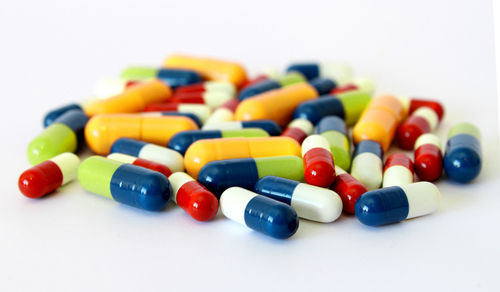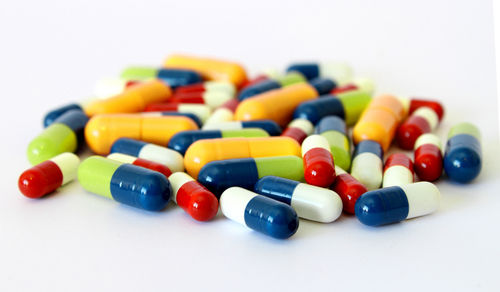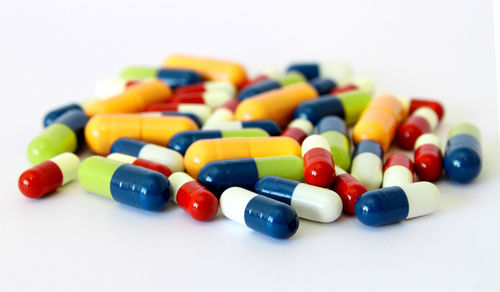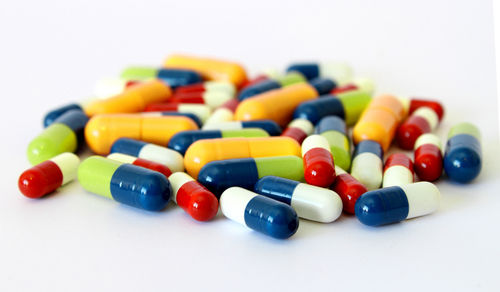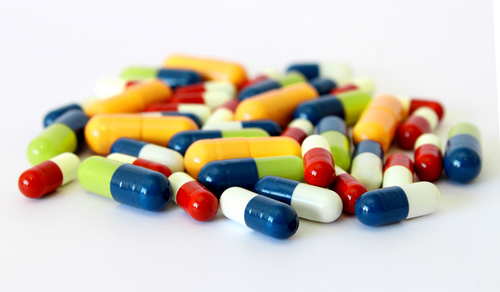
Lycopene, Vitamins, Mineral & Ginseng Capsule
71 INR/Box
Product Details:
- Purity 98%
- Formulations Type General Drugs
- Formulations Form Capsules
- Gender/Age Group Adult
- Storage Instructions Dry Place
- Click to view more
X
Lycopene, Vitamins, Mineral & Ginseng Capsule Price And Quantity
- 300 Box
- 71 INR/Box
Lycopene, Vitamins, Mineral & Ginseng Capsule Product Specifications
- 98%
- Adult
- Capsules
- Dry Place
- General Drugs
Lycopene, Vitamins, Mineral & Ginseng Capsule Trade Information
- Cash in Advance (CID) Cash Advance (CA)
- 300 Box Per Month
- 1 Months
- Yes
- Sample costs shipping and taxes has to be paid by the buyer
- Western Europe Australia Eastern Europe Middle East Central America South America Asia North America Africa
- All India
Product Description
This combination of Ginseng, Lycopene, multivitamins and minerals helps to rejuvenates and strengthens body organs. This health supplement helps in countering fatigue and keeps body fit and active all day long. Its benefits are very broad; it is effective in supporting the body during illness and protecting the organs from infection, and it is also an effective regulator of the nervous system. It promotes much improved concentration and deep, restorative sleep, as well as, fighting episodes of dementia. This combination is also necessary to make certain neurotransmitters. These neurotransmitters are the signals that carry thoughts, feelings, and commands around our brains and throughout our nervous system. It also offers multiple benefits for aging skin, by improving skin's elasticity, dramatically enhance its barrier function, help erase discolorations, and revive skin's healthy tone and texture. This health supplement has powerful antioxidant actions, allows good nutrients in and remove cellular junk and prevent toxins from entering the cells. Strong healthy cell membranes are vital in the prevention of many diseases.Indications and Usage:
Helps in countering fatigue
Strengthens immune function
Effective in cardiovascular diseases
Enhance central nervous system function
Restore energy and vitality after illness
Improves concentration
Anti-ageing
Effective in bone health
About Composition:
Lycopene 6%:
Lycopene is a fat-soluble red pigment produced by plants and some microorganisms. It represents the major carotenoid in tomatoes and is found to a lesser extent in guava, pink grapefruit, watermelon and papaya. In contrast to other carotenoids, this lipophilic acyclic isomer of -carotene lacks vitamin A activity and, although it represents the most predominant carotenoid in human plasma that is enriched in (very-) low-density lipoprotein fractions. Lycopene is especially interesting because of its considerable antioxidant activity that highly exceeds that of -carotene and tocopherol. It possesses an impressive spectrum of health beneficial properties, ranging from hypocholesterolemic and cardio-protective effects to anti-inflammatory and anti-mutagenic activity and a remarkable anti-cancer potential. Beside this, a high lycopene serum level might be linked to a lower risk for age-related macular degeneration.
Ginseng:
Ginseng is believed to be the most traditional medical herb contains many active constituent ginsenosides. It has extensive pharmacological effects and specific mechanisms of action in Chinese herb medicine. Ginsenosides can inhibit ROS production, stimulate NO production, increase immune function, enhance central nervous system function, and prevent cardiovascular or other diseases. It is considered as the cream of the crop of medicinal plants when it comes to tackling fatigue. It is particularly recommended for those lacking in energy, as it is very strong and healthy stimulant. Ginseng is considered a panacea in that it treats a great number of problems and helps the body to combat many different diseases. Another notable (but not forgettable) benefit of Ginseng is its excellent capacity for balancing the nervous system, largely due to its abundance of group B vitamins. Because of this, Ginseng promotes much improved concentration and deep, restorative sleep, as well as, fighting episodes of dementia. It can be very useful for those suffering from emotional as well as physical hardships, and also for those who are trying to withdraw from drugs. Finally, it is an excellent plant for convalescents wishing to restore energy and vitality after illness or sporting injury.
Vitamin C:
Vitamin C is a water-soluble vitamin that is necessary for normal growth and development. It is one of many antioxidants. Antioxidants are nutrients that block some of the damage caused by free radicals. Vitamin C is needed for the growth and repair of tissues in all parts of your body. It is used to:
Form an important protein used to make skin, tendons, ligaments, and blood vessels
Heal wounds and form scar tissue
Repair and maintain cartilage, bones, and teeth
Useful in aging process, heart disease, and conditions like arthritis
Niacinamide:
Nicotinamide, also known as niacinamide and nicotinic amide, is the amide of nicotinic acid (vitamin B3 / niacin). Nicotinamide is a water-soluble vitamin and is part of the vitamin B group. It occurs in trace amounts mainly in meat, fish, nuts, and mushrooms, as well as to a lesser extent in some vegetables. Niacinamide is a potent cell-communicating ingredient that offers multiple benefits for aging skin. Assuming skin is being protected from sun exposure, it can improve skin's elasticity, dramatically enhance its barrier function, help erase discolorations, and revive skin's healthy tone and texture. It also has a growing reputation for being able to treat an uneven skin tone and to mitigate acne and the red marks it leaves behind (known as post-inflammatory hyperpigmentation). It is an excellent ingredient for those struggling with wrinkles and breakouts. Niacinamide is stable in the presence of heat and light.
Vitamin E:
Vitamin E is a natural skin-conditioning agent and antioxidant. It is a fat-soluble vitamin that can be isolated from vegetable oils. It is also found in dairy products, meat, eggs, cereals, nuts, and leafy green and yellow vegetables. Its substantiated benefits include enhancing the efficacy of active sunscreen ingredients, reducing the formation of free radicals from exposure to UV rays, promoting the healing process, strengthening the skin's barrier function, protecting the skin barrier's lipid balance, and reducing trans-epidermal water loss. Attributed with antioxidant, anti-aging, moisturizing, anti-inflammatory, and enhanced SPF properties, tocopherol acetate is valued both as a dietary supplement and skincare active.
Calcium Pantothenate:
It is a synthetic substance made from pantothenic acid. Vitamin B5 is one of the eight B vitamins and an essential nutrient our body uses to create energy and break down carbohydrates and fats. Our body requires vitamin B5 to carry out many nervous system functions. Doctors also prescribe Calcium D-pantothenate as a treatment for acne.
Vitamin B2:
Like all the B vitamins, vitamin B2 plays a key role in energy production. Its role here is complicatedit is important both for the energy-producing electron transport chain and the metabolism of fat molecules into chemically useful energy. Additionally, vitamin B2 plays a role in the chemistry of other nutrients involved in energy production, including folate and vitamin B6. It is one of many nutrients required to recycle glutathione, which is one of the most important antioxidants in the human body.
Vitamin B1:
Thiamine is an essential nutrient, and all the tissues of the body, including the brain, need thiamine to function properly. B1 is a key player in the production of energy from dietary carbohydrates and fats. It plays the most critical role of all, acting as the gate keeper between the less efficient step of early carbohydrate breakdown and the very energy-rich Krebs' cycle and electron transport chain. In addition to its role in energy production, vitamin B1 plays a key role in the structure and integrity of the cells of the brain. If the deficiency is very advanced, or occurs at a critical period of brain development, the damage can be quite severe.
Vitamin B6:
Vitamin B6 is a water-soluble vitamin. Water-soluble vitamins dissolve in water. The body cannot store them. Leftover amounts of the vitamin leave the body through the urine. That means you need a continuous supply of such vitamins in your diet. Vitamin B6 helps the body to make antibodies that are needed to fight many diseases, maintains normal nerve function, and makes hemoglobin that carries oxygen in the red blood cells to the tissues. A vitamin B6 deficiency can cause a form of anemia. It breaks down proteins. The more protein you eat, the more vitamin B6 you need. Vitamin B6 also keeps blood sugar (glucose) in normal ranges.
Vitamin A (as acetate):
Vitamin A (retinol) is a vitamin and is necessary for life and overall health. It is especially important for the health of the eyes, lungs, bones, skin, immune system, and protein formation. Studies show that millions of people do not convert beta-carotene into vitamin A well enough to substitute for vitamin A or get the RDA of vitamin A from their diets. Therefore, many people need to supplement vitamin A. The World Health Organization recommends that all pregnant women take Vitamin A as retinol. They also say vitamin A may reduce the risk of birth defects.
Folic Acid:
Folic acid is a type of B vitamin. It is the man-made (synthetic) form of folate that is found in supplements and added to fortified foods. It is water-soluble. It works along with vitamin B12 and vitamin C to help the body break down, use, and create new proteins. Folate aids in the production of red blood cells, synthesis of DNA. Folic acid supplements may also be used to treat folic acid deficiency, certain menstrual problems, and leg ulcers.
Vitamin D3:
Vitamin D3 is used to treat and prevent low levels of calcium in the blood of patients whose kidneys or parathyroid glands (glands in the neck that release natural substances to control the amount of calcium in the blood) are not working normally. Low blood levels of calcium may cause bone disease. It works by helping the body to use more of the calcium found in foods or supplements.
Vitamin B12:
Methylcobalamin (mecobalamin, MeCbl, or MeB12 or vitamin B12) is a cobalamin, a form of vitamin B. It differs from cyanocobalamin, in that the cyanide is replaced by a methyl group. Methylcobalamin is the most potent form of Vitamin B12 found in nature. It circulates through the bloodstream and is one of two naturally-occurring coenzyme forms of vitamin B12 that the body utilizes. The body needs B12 to convert homocysteine to methionine, protect DNA and RNA, support energy, protect nerve and brain cells, stimulate serotonin production, contribute to red blood cell formation, support immune function, and maintain a positive mood. This B12 form has a higher stability and bioavailability and doesn't require conversion.
Calcium:
Calcium is a mineral that is an essential part of bones and teeth. The heart, nerves, and blood-clotting systems also need calcium to work.
Calcium is used for treatment and prevention of low calcium levels and resulting bone conditions including osteoporosis (weak bones due to low bone density), rickets (a condition in children involving softening of the bones), and osteomalacia (a softening of bones involving pain). Calcium is also used for premenstrual syndrome (PMS), high blood pressure in pregnancy (pre-eclampsia), and reducing the risk of colon and rectal cancers.
Phosphorus:
Phosphorus is a mineral that makes up 1% of a person's total body weight. It is present in every cell of the body. Most of the phosphorus in the body is found in the bones and teeth.
The main function of phosphorus is in the formation of bones and teeth. It plays an important role in how the body uses carbohydrates and fats. It is also needed for the body to make protein for the growth, maintenance, and repair of cells and tissues. Phosphorus also helps the body make ATP, a molecule the body uses to store energy.
Phosphorus works with the B vitamins. It also helps with the following:
Kidney function
Muscle contractions
Normal heartbeat
Nerve signaling
Iron:
Iron is a mineral that our bodies need for many functions. For example, iron is part of hemoglobin, a protein which carries oxygen from our lungs throughout our bodies. It helps our muscles store and use oxygen. Iron is also part of many other proteins and enzymes. Your body needs the right amount of iron. If you have too little iron, you may develop iron deficiency anemia.
Zinc:
Zinc is an important trace mineral that people need to stay healthy. Zinc is found in cells throughout the body. It is needed for the body's defensive (immune) system to properly work. It plays a role in cell division, cell growth, wound healing, and the breakdown of carbohydrates. It is also needed for the senses of smell and taste. During pregnancy, infancy, and childhood the body needs zinc to grow and develop properly.
Magnesium:
Magnesium is an essential mineral for human nutrition. Magnesium is needed for more than 300 biochemical reactions in the body. It helps to maintain normal nerve and muscle function, supports a healthy immune system, keeps the heart beat steady, and helps bones remain strong. It also helps regulate blood glucose levels and aid in the production of energy and protein. There is ongoing research into the role of magnesium in preventing and managing disorders such as high blood pressure, heart disease, and diabetes.
Iodine:
Iodine is a trace mineral and a nutrient found naturally in the body. Iodine is needed for the normal metabolism of cells. Metabolism is the process of converting food into energy. Humans need iodine for normal thyroid function, and for the production of thyroid hormones.
Manganese:
Manganese is a mineral that is found in several foods including nuts, legumes, seeds, tea, whole grains, and leafy green vegetables. It is considered an essential nutrient, because the body requires it to function properly.
Manganese is used in manganese deficiency, a condition in which the body doesn't have enough manganese. It is also used for weak bones (osteoporosis), a type of "tired blood" (anemia), and symptoms of premenstrual syndrome (PMS).
Potassium:
Potassium is a mineral that the body needs to work normally. It helps nerves and muscles communicate. It also helps move nutrients into cells and waste products out of cells. A diet rich in potassium helps to offset some of sodium's harmful effects on blood pressure.
Copper:
Copper is an essential trace mineral present in all body tissues.Copper works with iron to help the body form red blood cells. It also helps keep the blood vessels, nerves, immune system, and bones healthy.
Selenium:
Selenium is an essential trace mineral. This means your body must get this mineral in the food you eat. Small amounts of selenium are good for your health.
Selenium helps the body with:
Making special proteins, called antioxidant enzymes, which play a role in preventing cell damage
Pharmacokinetics:
Lycopene:
Absorption: Processing of tomatoes increases the lycopene content because of the concentration operations and more importantly it makes it more bioavailable. Because lycopene is so insoluble in water and is so tightly bound to vegetable fiber, the bioavailablity of lycopene is increased by processing. For example cooking and crushing tomatoes.
After ingestion, lycopene is incorporated into lipid micelles in the small intestine. These micelles are formed from dietary fats and bile acids, and help to solubilize the hydrophobic lycopene and allow it to permeate the intestinal mucosal cells by a passive transport mechanism.
Distribution: In blood plasma, lycopene is eventually distributed into the very low and low density lipoproteins fractions. Lycopene is mainly distributed to fatty tissues and organs such as the adrenal glands, liver, prostate and testes.
Metabolism: Little is known about the liver metabolism of lycopene, but like other carotenoids, lycopene is incorporated into chylomicrons and released into the lymphatic system.
Excretion: Lycopene metabolites are excreted via urine.
Ginseng:
Absorption: The ginsenosides found in ginseng appear to be poorly absorbed. The bioavailability of Rb1 and Rg1 (ginsenosides) after oral administration is 0.71% and 3.29%, respectively. Compound K may be passively absorbed from the digestive tract. M4 was absorbed from the small intestine, was esterified with fatty acids, and then accumulated in tissues, including the lungs and liver. High elimination in the stomach, large intestine, and liver may contribute to the low bioavailability of these ginsenosides, but low membrane permeability is probably a greater limiting factor, especially as ginsenosides may be passively absorbed by simple diffusion or dependent on active transport.
Distribution: Once absorbed, the distribution of ginsenosides could be described by a two-compartment model. The ginsenoside Rg1 may have a plasma protein binding of 24% and tissue protein binding of 48% in the liver.
Metabolism: Intestinal metabolites of ginsenosides, are 20- O-(beta-D-glucopyranosyl)-20(S)-protopanaxadiol, known as compound K, and 20(S)-protopanaxatriol, known as M4.
Excretion: It appears that ginsenosides are excreted in the urine only in trace amounts.
Side Effects:
Common side-effects include:
GI complaints
Headache
Dizziness
Nervousness
Precautions:
Before taking this combination, tell your doctor or pharmacist if you are:
Known hypersensitivity
During pregnancy and lactation
Ginseng may lower blood sugar levels too much, especially in people with diabetes. If you have diabetes, monitor your blood sugar more carefully while using this product.
Tell your doctor if you have or have ever had blood clotting/bleeding disorders, kidney problems, liver problems, high blood fats (cholesterol/triglycerides), recent or planned surgery.
Storage:
Store in a cool, dry place.
Protect from direct sunlight.
Tell us about your requirement

Price:
Quantity
Select Unit
- 50
- 100
- 200
- 250
- 500
- 1000+
Additional detail
Mobile number
Email


